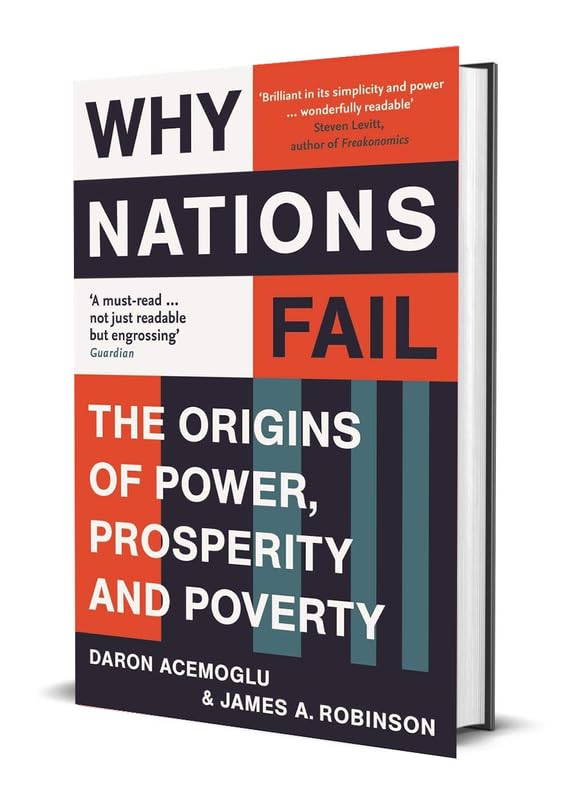Original Title
Why Nations Fail
Subject & College
Series
Publisher, Place
Language
English
Readers Feedback
Why Nations Fail
BOOK REVIEW(By: Pranav Bhondve- I BALLB- DIV A) Why Nations Fail: The Origins of Power, Prosperity, and Poverty by Daron Acemoglu and James A. Robinson...Read More
Pranav Bhondve
Why Nations Fail
BOOK REVIEW(By: Pranav Bhondve- I BALLB- DIV A)
Why Nations Fail: The Origins of Power, Prosperity, and Poverty by Daron
Acemoglu and James A. Robinson published in March 2012.
This book dives into the reasons why economic inequality is so common in the
world today and identifies that poor decisions of those in political power are the
main reason for unfairness rather than culture, geography, climate or any other
factor.
The book tries to answer why some nation remain poverty stricken and otherlive in abundance ?
One of the primary factor which it considers is economic and political
institutions, which the authors have drawn extensively from historical and
contemporary examples to substantiate their claim they have analyzed the
Roman Empire, medieval Venice, colonial Latin America, and modern-day
countries like the United States and Zimbabwe. Each case showed the
dependence between institutions and economic outcomes.
For instance, United States and Mexico. In the 19th century, the U.S. adopted
inclusive institutions that promoted innovation and entrepreneurship, while
Mexico’s extractive institutions concentrated power and wealth, stifling
economic growth and perpetuating inequality.
The three important factors around which the book revolves are:
Firstly, The books rejects the old age theories believing in the fact that location
of the place determines the prosperity of the country as there are many
examples of countries side by side have huge contrast in their economic
condition, rather the book says the economic landscape does, for example
public services, property laws, access to financing etc.
For example USA adopted to inclusive economic institutions which paved the
way for economic growth, as they encourage the participants to participate in
economic activities whereas in Extractive Economic institutions where income
is received by one group by extraction the certain group which leads to
exploitation and discrimination in basis of socio-economic status, a modern
example for this can be North Korea.
Similarly politics can also plays an determining role like inclusive and
extractive political institutions.
Secondly, The book then delves into how one event can mean a country takes
an entirely different path, changing the course of its future. For instance, the
book gives example of black death which took almost half of the Europe’s
population which was responsible for changing Europe’s economic future.
Hence, we see that this event is influential enough to overturn the socio-political balance of nation or continent, as due to shortage of labour the peasants in
western Europe started demanding lower taxes and more rights whereas in Eastern Europe peasants were less organized, and due to this, the landowners started hiking taxes and making the system even more extractive. Authors call
this as critical Juncture its where two similar regions grow in different directions. Thirdly the book also talks believes stopping the cycle of poverty is hard but it isn’t impossible. The book tries to answer the question what can countries do to fix the extractive institutions they have in place. The authors places an pressing need on encouraging inclusive institutions so these countries can grown their own prosperity, meaning inclusion and coming together of various groups. The book gives example of Brazil where people came together to throw the military dictatorship in 1985, this paved the way for country’s socio-economic
prosperity can be proven by the fact that from 2000 to 2012 Brazil was one of
the fastest growing economies.
This book offers the most combining interest from subject like economics,
political science, and history. It’s impressive command of history and author’s
compelling argument.
Also the author has maintained a very clear and engaging style which maintains
the interest of the readers. And the insights offered by book have significant
relevance to policy making, providing blueprint on escaping nations ‘poverty
trap’.
Reading this book become highly relevant in contemporary times as with rising
inequality, democratic regression, and challenges such as climate change, the
ideas that Why Nations Fail presents are very essential in today’s world. The
rise of populist governments and the decreasing of democratic values in world
regions particularly shows that inclusive institutions are fragile in such
incorporated regimes. Additionally, the book provides useful advice for
developing countries who are trying to industrialize. For example, it is
necessary for India and Brazil to try and find a middle ground while trying to
expand the economy and put governance that is inclusive. Likewise, countries
such as Afghanistan and Sudan that are emerging out of conflict may find the
lessons on institutional change as a precondition of growth and stability useful.
In conclusion, Why Nations Fail examines the relationship between institutions,
power, and wealth in a very competent manner. Acemoglu and Robinson’s
thesis of why nations fail, that inclusive institutions are an indispensable factor
for continuous success, is persuasive and provides food for thought. It also
offers a huge amount of diverse insights and ideas that would interest those in
economics, history, or political science. The insights from Why Nations Fail offer valuable understanding of the challenges nations encounter in governance
and development worldwide.

